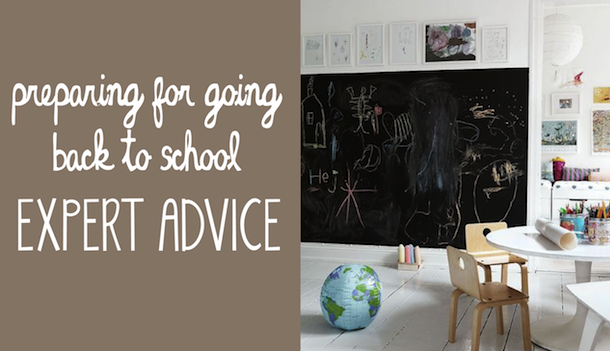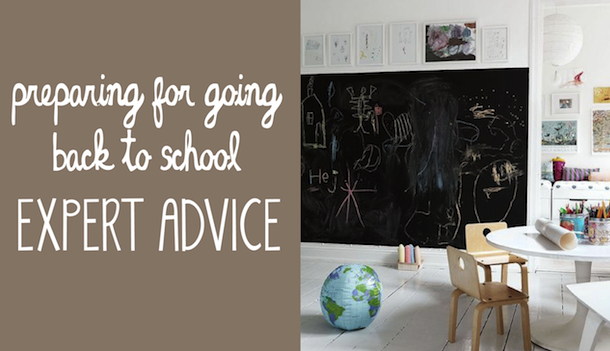
 With the school holidays nearing an end (we can hear you jumping for joy mama!), for many munchkins it means a time of change or adjustment is near — either starting or changing to a new school or class. We sat down for a chat with early childhood expert, Shona Sanosi of Blue House Nursery and International School to get her best tips and advice for helping little ones make the transition successfully.
With the school holidays nearing an end (we can hear you jumping for joy mama!), for many munchkins it means a time of change or adjustment is near — either starting or changing to a new school or class. We sat down for a chat with early childhood expert, Shona Sanosi of Blue House Nursery and International School to get her best tips and advice for helping little ones make the transition successfully.
How can I help my child get ready for school?
It’s important to always prepare children for any new event in their lives and starting school is definitely one of those occasions. Parents should speak honestly, yet positively with their child about what lays ahead and always respect their child’s emotions during this time. Use language such as, “I understand that you are feeling (name the emotion)” and then proceed with a positive and open dialogue and ask your child how you can help them through this.
For very young children who are starting preschool and may not have sufficient language to express their feelings, be mindful and observant of their body language and any changes in behaviour.
School visits prior to starting school are certainly beneficial, as is involving your child in buying a new bag, their uniform and labelling their things etc. The preparation phase creates the perfect opportunity to casually initiate conversations and address any concerns your child may have.
My child won’t know anybody at his new school – what can I do to make the transition easier for him?
I would suggest you contact your child’s school prior to starting and ask for a class list. If the school is not comfortable in giving out this information, please ask them to contact families on your behalf, giving them your contact details and you will be surprised how many offers of playdates you and your child will receive prior to starting school!
If this is not possible, once again reassure your child that many children will be new on the first day and will also be looking for friends and you could even role model with your child about how to make those initial introductions. It could be as simple as a smile! There are some lovely story books you could read on this subject with your child too.
Try to support your child with arranging playdates with new school mates in the first few weeks as this will really help strengthen blossoming friendships.
What can I do at home to make the adjustment to full-time school easier for my child? He hasn’t been away 5 days per week before!
If you have the option to gradually increase the number of days and hours attended I would suggest you take it, even just for a short period of time, a gradual transition is always best.
If this is not possible you can help at home by ensuring that your child gets enough sleep, eats well and has only quiet activities at home after school. You want to ensure they get enough rest in those early days before your child builds up their stamina to cope with a full week of school.
My child is still struggling with completing tasks independently – how can I ensure he’ll get the help he needs at school?
Again, preparation and information is key. Try to find out the expectations of the school in terms of tasks and objectives – encourage your child to complete these tasks independently at home too. Communication with class teachers is essential and connections between home and school plays a crucial role in offering the necessary support.
What can I expect in the early days of this new school journey?
Good question! This will depend on so many factors. Some children sail through their first few days at school and this is largely based on your child’s age, personality and character.
Other children can have a great first day and then wobble on day 2 and 3. At home you may notice slight regression with sleeping and possibly eating and your child may seek more reassurance from you in terms of physical presence, love and cuddles. All of this behaviour is normal and your child should settle well within the first few weeks. If not, then please ensure you chat through any concerns with the class teachers.
Any other advice?
The biggest piece of advice I can give all parents is that they themselves must be ready for their child to start school. Sometimes the child is ready but the parents are not!
Parents who display anything other than a positive attitude could influence their child’s emotions too. It is normal of course to have a few tears after dropping off your child on those first few days (I know I did!) however as long as you know in your hearts of hearts that you have chosen the right school for your child and that they will settle in, you will be fine.
Finally, communication is key – conversations, emails and meetings with teachers should always be available in any good school.
A UK native, Shona Sanosi holds the NNEB qualification and has over 20 years experience working with young children and their families. In addition to being the School Director at Blue House Nursery and International School, Shona continues to work with and partner families as an Early Years Advisor. It was in 2007 that Shona began researching more about the Reggio Emilia Approach to early years education and with this investigation (plus the arrival of her curious and creative twins, Ella and Alfie in 2006) came a renewed energy inspiring Blue House Nursery and International School, the first Reggio Emilia Inspired School in Singapore with a fully emergent curriculum for children aged 18 months to 6 years.






 View All
View All





 View All
View All









 View All
View All










